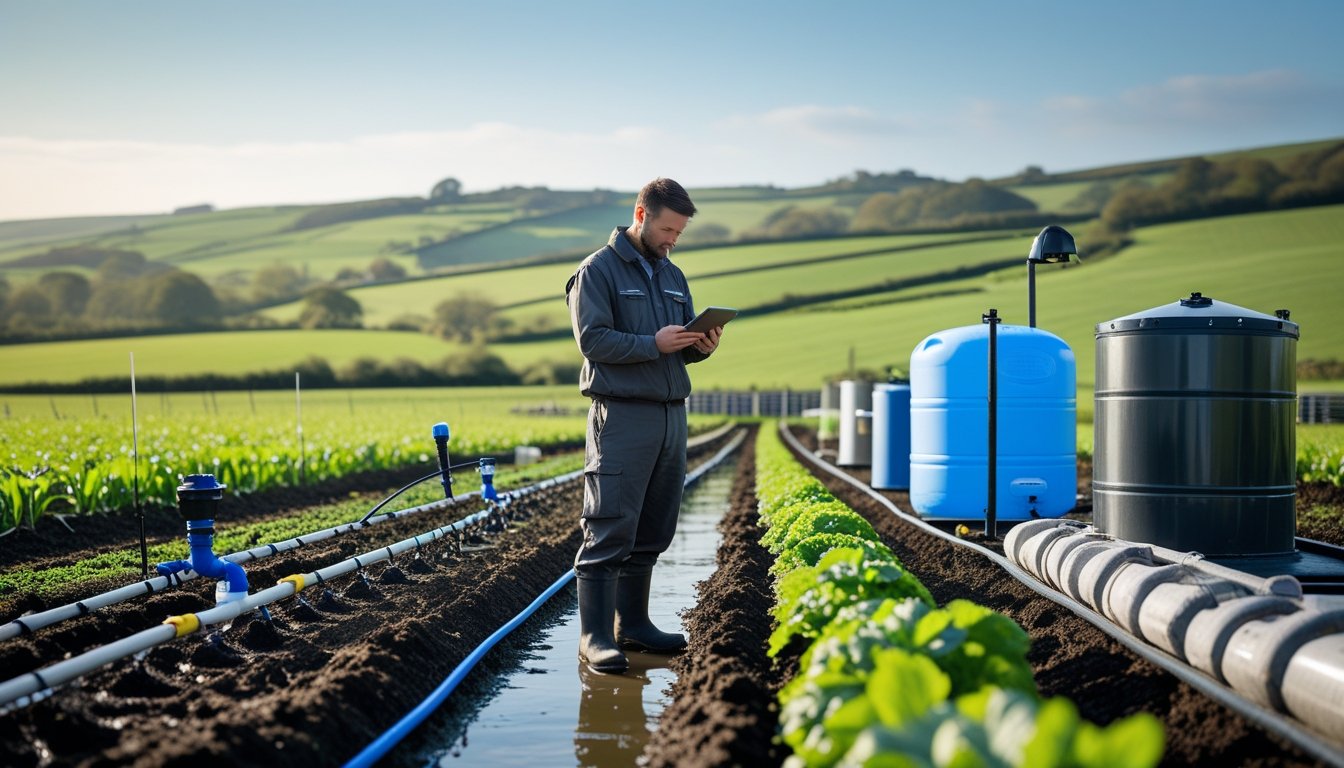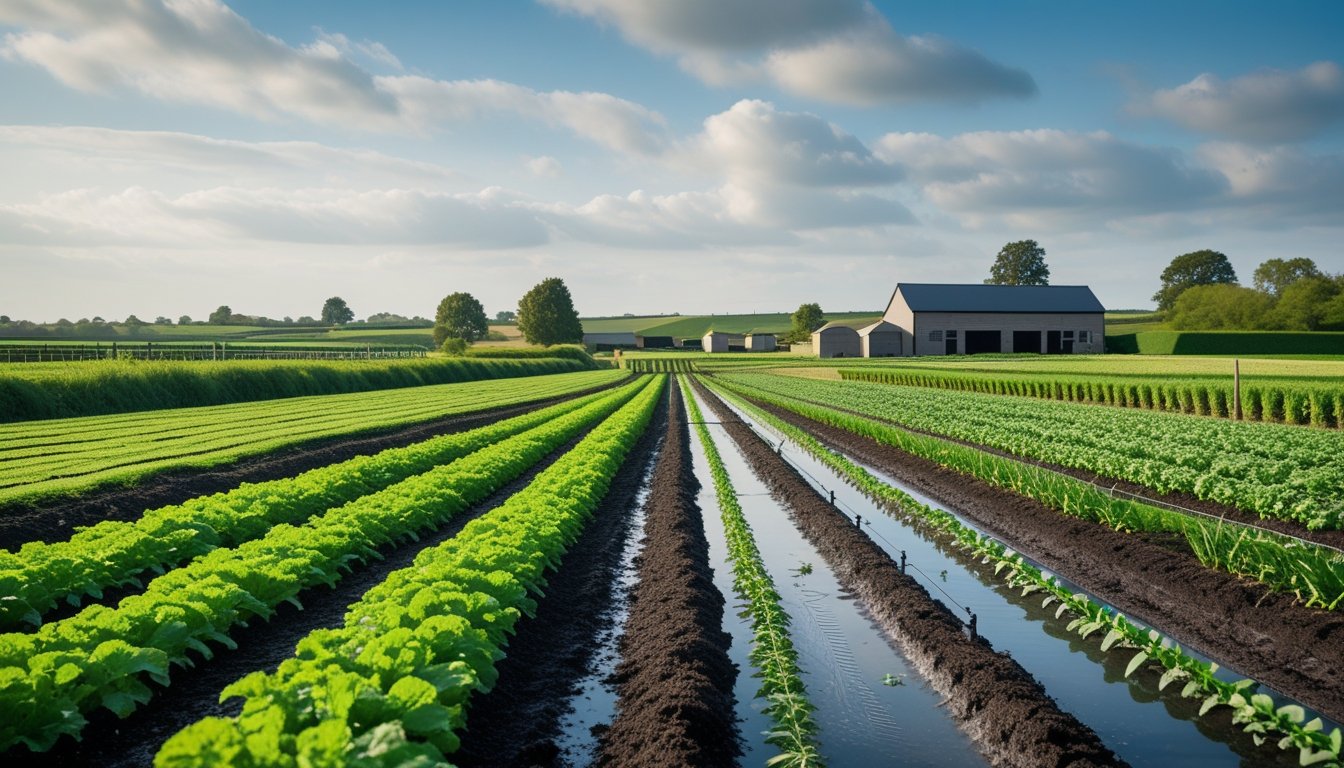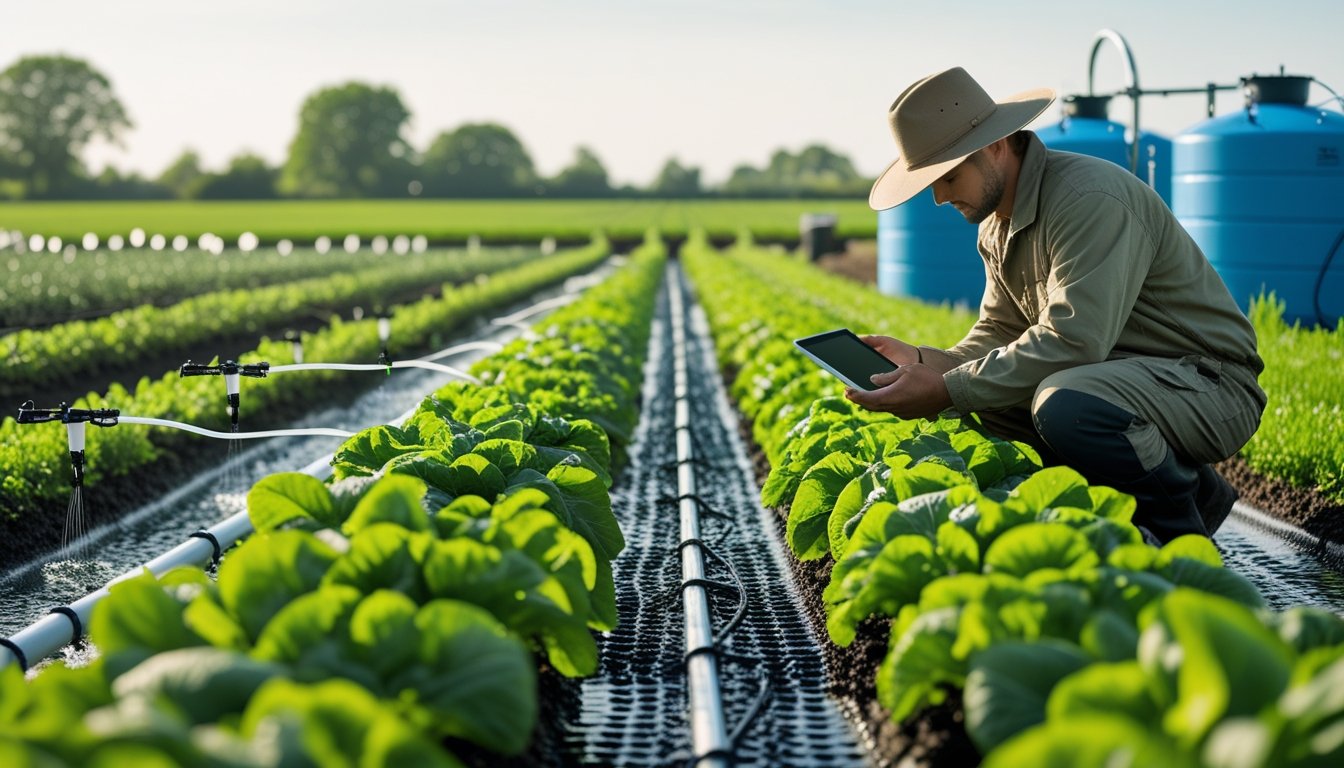Late updated: 17 Oct 2025 15:10
Written by: Oliver Bennett
Innovative Water Conservation Solutions For UK Farms: Advancing Agricultural Efficiency
Water conservation in UK agriculture is no longer just a recommendation—it's a necessity. As farms face mounting pressures from climate change and water scarcity, innovative solutions are reshaping how we manage this vital resource. One standout method involves on-farm water storage facilities, which allow farmers to capture and store winter rainfall to use during the drier months, making efficient irrigation possible even during vulnerable periods.

Implementing cutting-edge technologies like solar-powered drip systems and smart sensors, UK farms are boosting crop yields while reducing water consumption. These systems offer real-time monitoring, helping to optimise water distribution across fields. The benefits extend beyond mere conservation; enhanced water management aids in healthier soil, which in turn improves agricultural sustainability.
As we look at agricultural sustainability, we find new ways to make farming more resilient. Sustainable practices do not just help conserve water; they also pave the way for a future where both the environment and humanity thrive in harmony. Our focus is on creating a more water-efficient sector that aligns with nature's needs and market demands.
Key Takeaways
- Innovative solutions are essential for water management in UK agriculture.
- Technologies like drip systems and sensors enhance farming sustainability.
- Efficient water use in agriculture promotes long-term environmental health.
Innovative Water Conservation Solutions for UK Farms
We are witnessing a revolution in water conservation methods within UK agriculture. By implementing state-of-the-art technologies, UK farms are boosting water efficiency and ensuring sustainable practices.
Drip Irrigation and Precision Irrigation Technologies
Drip irrigation systems are at the forefront of water-saving methods. These systems deliver water directly to the plant's root zone, minimising evaporation and waste. Precision agriculture, on the other hand, allows us to deploy water only where needed, using detailed data analysis. Techniques like GPS mapping and GIS assist in crafting precise irrigation plans. The integration of these systems improves both water use and crop yield, ensuring agricultural sustainability.
Rainwater Harvesting and Rainwater Collection Systems
With water resources becoming scarce due to climate change, implementing rainwater harvesting systems is essential. These systems capture and store rainwater for agricultural use, reducing reliance on mains water. By using rainwater collection, farms can build resilience against variable weather patterns, thus ensuring consistent water availability. Such methods offer not only a solution to water scarcity but also an economic advantage through reduced water costs.
Soil Moisture Sensors and Remote Sensing Applications
Soil moisture sensors are pivotal in advancing water conservation. These devices provide real-time data about soil conditions, enabling precise irrigation decisions. Remote sensing applications, which include aerial imagery and satellite data, further enhance our capability to assess crop conditions and optimally manage water use. Integrating these technologies leads to informed and responsible water management, which is crucial for improving irrigation efficiency and conserving our water resources.
Efficient Irrigation Schedules and Weather-Based Controllers
Establishing efficient irrigation schedules is vital for maximising water use. Weather-based controllers adjust irrigation timing based on meteorological data, ensuring that water is applied during optimal conditions. Implementing these controllers aids in synchronising irrigation with natural rainfall, thus conserving water and benefiting the environment. By carefully managing water applications, we can effectively tackle challenges posed by climate change while promoting sustainable agriculture.
Sustainable Farming Practices to Enhance Water Retention

To increase water retention on UK farms, adopting certain sustainable farming practices is essential. These practices improve soil health, promote biodiversity, and enhance farm productivity. By focusing on a few key strategies, we can significantly boost water retention, ensuring both environmental and economic benefits.
Mulching and Cover Cropping for Improved Soil Moisture
Mulching involves spreading organic or inorganic materials over the soil surface. This practice reduces evaporation, maintains soil moisture, and suppresses weeds. Organic mulches, such as straw or wood chips, decompose over time, enriching the soil with nutrients and improving its structure.
Cover crops, such as clover or rye, further aid in retaining moisture by reducing erosion and providing a protective soil layer. These crops increase biodiversity and enhance soil health through improved organic matter content, which fosters better water infiltration.
Conservation Tillage and Soil Management Strategies
Conservation tillage minimises soil disturbance, which helps maintain the integrity of soil structure. This practice reduces water runoff and enhances the ability of the soil to retain moisture. By limiting ploughing, we also decrease erosion and maintain organic matter levels.
Adopting soil management practices like crop rotation can promote nutrient cycling and improve soil health. These strategies not only enhance crop yields but also contribute to better water retention, vital for sustainable farming.
Advancing Crop Resilience and Biodiversity
Enhancing crop resilience involves selecting plant varieties that are drought-resistant or have lower water requirements. These crops thrive in less favourable conditions, ensuring stable yields even during dry spells. By diversifying the types of crops grown, farms can increase biodiversity.
This helps in creating a more resilient ecosystem. A diverse range of plants fosters beneficial organisms that contribute to soil health and structure, promoting better water retention across the farm.
Integrating Water-Saving Approaches for Small-Scale Farmers
Small-scale farmers can adopt water-saving approaches such as drip irrigation to precisely deliver water to plants' roots. This technique reduces waste and improves water efficiency. Moreover, implementing rainwater harvesting systems collects and stores rainwater for irrigation use during dry periods.
Utilising low-cost methods such as mulching and cover cropping can be particularly beneficial for smaller operations. These strategies increase water retention without significant financial investment, supporting both environmental stewardship and food security.
Frequently Asked Questions

Our focus is on the efficient use of water in UK agriculture through practical solutions. By implementing rainwater harvesting, precision irrigation, and drought-resistant crops, UK farmers can significantly enhance water sustainability.
What are the best practices for reducing water usage on agricultural land in the UK?
Agricultural efficiency can be improved by adopting soil moisture management techniques such as mulching and the use of cover crops. These practices help to minimise evaporation and retain moisture in the soil, effectively reducing water usage.
How can rainwater harvesting be effectively implemented on farms across Britain?
Rainwater harvesting involves collecting and storing rainwater for later use. Installing gutters and storage tanks allows farms to capture rainfall from rooftops, providing a supplementary water source for irrigation and reducing dependency on mains water supply.
What impact does precision irrigation have on water conservation in the UK farming sector?
Precision irrigation utilises advanced technologies such as sensors and data management systems. These systems can monitor and respond to crop needs accurately, ensuring efficient water use and minimising wastage by targeting water delivery directly to the roots where it's needed most.
Which drought-resistant crops are most suitable for UK agriculture to enhance water sustainability?
In the UK, drought-resistant crops like barley and certain varieties of wheat and oats are ideal. These crops have adapted to require less water, making them suitable for areas that experience low rainfall or irregular water availability.
How can UK farmers utilise greywater systems for irrigation purposes?
Farmers can implement greywater systems by reusing water from household activities such as washing. By treating and filtering this water, it becomes suitable for irrigation, providing an environmentally friendly and cost-effective method to supply agriculture with non-potable water.
What government incentives are available for UK farmers who adopt water-saving technologies?
Farmers in the UK can access various incentives, including grants from the Farming Investment Fund, which supports the adoption of efficient irrigation equipment and the construction of farm reservoirs. These initiatives aim to encourage the uptake of sustainable water management practices in agriculture.
